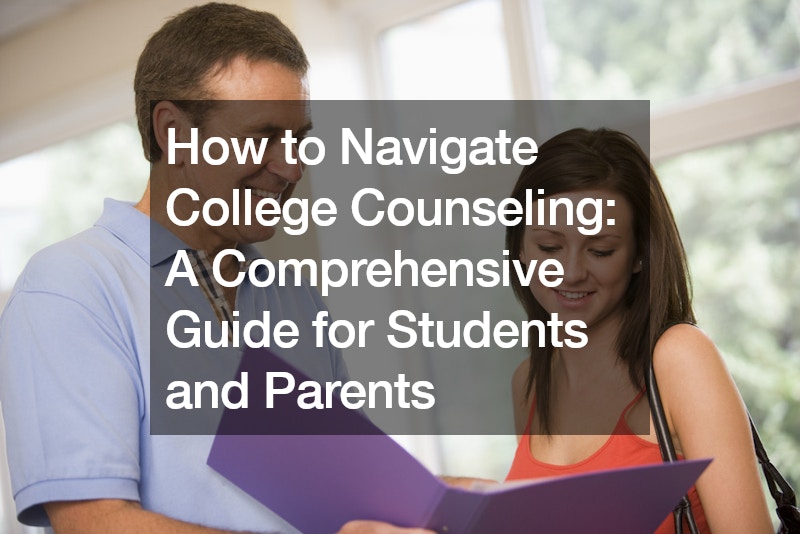
College is a pivotal point in a young person’s life, and the application process can feel overwhelming. This guide is here to help you, student and parent alike, navigate college counseling and make informed decisions.
Understanding College Counseling
College counselors are trained professionals who can guide students through the college application process. They offer a wealth of knowledge about colleges, application requirements, financial aid, and scholarships.
Here’s what you can expect from a college counselor:
Individualized Support: They meet with students one-on-one to discuss their academic goals, interests, and aspirations. Based on these discussions, they help students develop a college list that aligns with their needs and preferences. College Research: College counselors have access to extensive resources and databases to help students research colleges and universities. They can help you compare academic programs, campus life, and financial aid options. Standardized Testing Guidance: They can advise on which standardized tests (like the SAT or ACT) are required by different colleges and offer strategies for test preparation. Application Assistance: Counselors can guide you through the application process, including essay writing, recommendation letter requests, and deadlines. Financial Aid and Scholarship Support: They can help you navigate the financial aid process, understand financial aid packages, and search for scholarships to help offset college costs. The Role of Students
While college counselors are valuable resources, the ultimate responsibility for your college journey lies with you, the student. Here are some ways to actively participate in the college counseling process:
Self-discovery: Take some time for self-reflection. What are your academic interests? What kind of learning environment do you thrive in? What are your career aspirations? Knowing yourself will help you identify colleges that are a good fit. Research, Research, Research: Don’t solely rely on your counselor’s recommendations. Explore college websites, attend virtual college fairs, and connect with current students or alumni to learn more about different schools. Standardized Testing Preparation: Take ownership of your test preparation. Utilize practice tests, online resources, and prep courses (if needed) to perform your best on standardized tests. Essay Writing: The application essay is your chance to tell your story and showcase your personality. Start writing essays early, get feedback from your counselor, and revise them until they shine. Meet Deadlines: College applications have strict deadlines. Create a calendar to track application deadlines, test scores, financial aid forms, and scholarships. Be organized and stay ahead of schedule. Communication is Key: Maintain open communication with your counselor. Ask questions, express your concerns, and keep them updated on your progress. The Role of Parents
While the college search is ultimately the student’s journey, parents are crucial in providing support and guidance. Here’s how you can be a valuable asset:
Be a Support System: Listen to your child’s concerns and anxieties. Encourage them, celebrate their achievements, and offer emotional support. Financial Planning: Discuss college costs and financial aid options with your child. Be upfront about your financial situation and set realistic expectations. College Visits: If possible, accompany your child on college visits. This can be a valuable way to experience different campuses and get a feel for the school environment. Respecting Choices: While you can offer guidance, ultimately, the college decision belongs to your child. Respect and support their choices, even if it’s not your top pick. Become Informed: Educate yourself on the college application process, financial aid options, and scholarship opportunities. Utilize resources available to parents through your child’s school or online resources. Be Patient & Encouraging: The college application process can be stressful. Stay patient, avoid micromanaging, and encourage your child to stay positive and focused. Working with Your College Counselor
Here are some tips for maximizing your experience with your college counselor:
Schedule Regular Meetings: Meet with your counselor regularly to discuss your progress, update them on your college list, and address any concerns. Be Prepared: Come to meetings with a list of questions and topics you want to discuss. The more prepared you are, the more productive your sessions will be. Be Open and Honest: Be honest with your counselor about your academic strengths and weaknesses, financial situation, and college preferences. Take Notes: During meetings, take notes to document important information and deadlines. Follow-Up: If your counselor provides you with resources or tasks, follow up on them. Demonstrate your commitment to the process. Beyond the Counselor: Additional Resources College counselors are a valuable resource, but they’re not the only game in town. Here are some additional resources to consider:
School Guidance Counselors: Many schools have guidance counselors who can offer support with college applications, scholarship searches, and career planning. Online Resources: There are numerous websites and online platforms dedicated to college admissions. These sites offer a wealth of information on colleges, financial aid, scholarships, and the application process. College Fairs: Attend virtual or in-person college fairs to connect with representatives from various colleges and universities. These events can be a great way to learn about different schools and ask questions directly. College Admissions Books: Numerous books offer guidance on the college application process. These can be helpful resources for students who prefer a more self-directed approach. Test Prep Resources: Many companies offer test preparation courses and resources for standardized tests like the SAT and ACT. Utilize practice tests, online resources, and prep courses (if needed) to perform your best. Scholarship Search Engines: Online scholarship search engines can help you find scholarships that match your academic profile, interests, and financial needs. Finding the Right College Counselor
There are different types of college counselors available, each with their own expertise and approach. Here’s how to find the right counselor for you:
School Counselors: Many schools offer college counseling services to their students. This is a free and readily available resource. Independent College Counselors: Independent college counselors work directly with students and families. They offer personalized guidance and support throughout the application process. Fees vary depending on the counselor’s experience and the services offered. College Admissions Consultants: Admissions consultants specialize in helping students gain admission to highly selective colleges. They offer more intensive support, often including essay editing and interview coaching. Fees for admissions consultants are typically higher than those for independent college counselors. Consider these factors when choosing a college counselor:
Experience: Look for a counselor with experience working with students with similar academic profiles and college goals to yours. Services Offered: Choose a counselor who offers the services you need, such as college research, application assistance, or financial aid guidance. Communication Style: Find a counselor whose communication style meshes well with yours. You should feel comfortable asking questions and expressing your concerns. Cost: Fees for college counselors can vary significantly. Set a budget and research counselors who fit within your financial limitations. Conclusion
The college application process can be challenging, but you can navigate it successfully with the right support and guidance. Utilize the resources available to you, including your college counselor, online tools, and scholarship opportunities. Remember, the most important thing is to find colleges that are a good fit for you and your goals. With hard work, dedication, and a little help from this guide, you can find the perfect college to launch the next chapter of your life.
.




